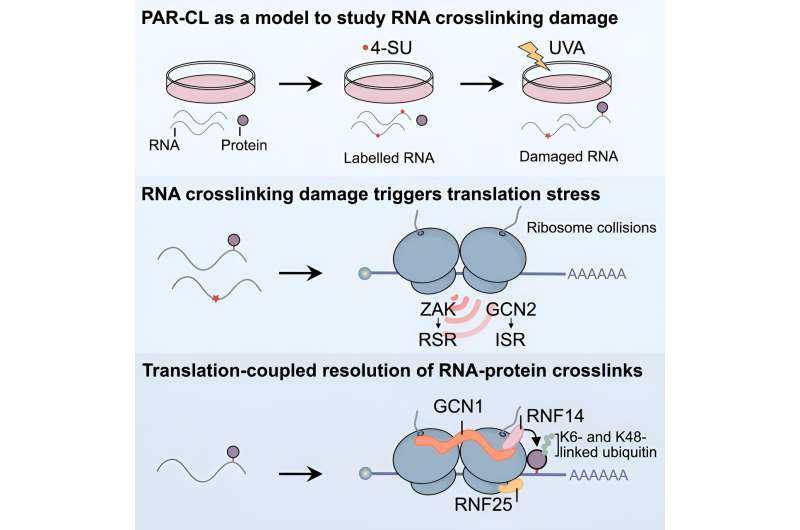This article has been reviewed according to Science X's editorial process and policies. Editors have highlighted the following attributes while ensuring the content's credibility:
fact-checked
peer-reviewed publication
trusted source
proofread
Study discovers colliding ribosomes activate RNA repair

Aldehydes are toxic compounds that are produced in the body by metabolic processes, especially upon alcohol consumption. They are dangerous because they bind to cellular macromolecules, such as DNA, RNA, and proteins, and crosslink them.
Crosslinking damage to DNA must be repaired by the cell to prevent premature aging and cancer. However, it was previously unknown whether and how cells sense and resolve crosslinking damage to single-stranded RNA. A team led by Professor Julian Stingele from the Gene Center Munich has now shown that RNA crosslinking damage is toxic because it impairs protein synthesis. The research is published in the journal Molecular Cell.
"It was previously difficult to study specifically RNA crosslinking damage, as most chemicals also damage DNA," says lead author Jacqueline Cordes.
"We therefore utilized a new approach to induce and study RNA damage in the absence of DNA damage," adds Dr. Shubo Zhao, also lead author of the study. Using this novel experimental system, the researchers uncovered a previously unknown mechanism by which the ribosome can act as a sensor for crosslinking damage.
Ribosomes run along the messenger molecule mRNA to translate the information stored in the mRNA into proteins. As the researchers demonstrate, the ribosome gets stuck as soon as it encounters a lesion. This leads to collisions with subsequent ribosomes, triggering removal of the damage.
"Our new findings indicate that compounds commonly considered solely as DNA-damaging agents challenge cellular homeostasis on a much broader level. Given that such agents are often used for chemotherapy, our work has imminent implications for the mechanisms of action of frequently-used anti-cancer drugs," says Stingele.
More information: Shubo Zhao et al, RNF14-dependent atypical ubiquitylation promotes translation-coupled resolution of RNA-protein crosslinks, Molecular Cell (2023). DOI: 10.1016/j.molcel.2023.10.012
Journal information: Molecular Cell
Provided by Ludwig Maximilian University of Munich





















